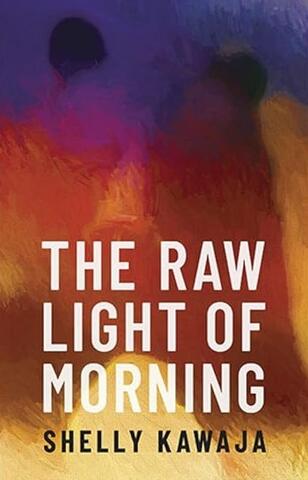
The Raw Light of Morning, Shelly Kawaja’s debut novel and winner of the $12,500 BMO Winterset Award in 2022 for outstanding literary work by a Newfoundlander or Labradorian, is at the same time a compelling story of domestic violence, poverty, and trauma, and a 1990s western Newfoundland coming-of-age character study of a young woman of remarkable resilience. This is Laurel’s story, and she is 14 in the opening scene, and forced to intervene to protect her mother from life-threatening violence.
Her mother is Maxine, loving but “a mess,” leaning heavily on her young daughter even before the inciting incident. They live with Laurel’s younger brother on a country road, physically close to town but culturally a world away. Laurel has to babysit Bud, her younger brother.
Kawaja fills big themes with small moments. In their country home, on television, “A woman, a news anchor, sat at a desk and laughed at whatever the man next to her said . . . They both laughed, heads tilted together, mouths gaping holes of static and teeth.” The TV reception is poor, the volume inaudible, and in that cinematic moment tension builds toward the return of Laurel’s stepfather.
“Rick filled the doorway . . . Laurel’s heels sank into the carpet.”
Rick is the worst. Violent. A mean, dangerous drunk. When he gets home, Laurel checks on her sleeping brother and barricades herself in her room. When her mother gets home soon afterward, Laurel can hear his brutal violence.
In the aftermath, Rick is gone. Her mother is injured and pregnant with Braya (named for a flower endemic to Newfoundland). They move into nearby Stephenville, which “felt a bit like an American frontier town that had gotten lost at sea and come ashore in western Newfoundland.”
They live in “the Crown,” a complex known to house people living on welfare, multiple stigmas shadowing their lives. For Laurel, trauma is the heaviest of them. There are flashbacks, stark remembrances of Rick’s final phrases. And blood, the smell of “clotted rust.”
The family is assigned a social worker, Tina, who helps them find the apartment. She is a blessing and an overseer. For them, Tina’s visits are work, but her presence never seems resented. She asserts authority but wants to help. She offers Laurel tips on breathing exercises during panic attacks. They don’t work. The family is scrutinized, powerless, and motivated to make positive impressions, to prove themselves worthy of independence. They are poor in a way they weren’t before.
In this work of literary realism, Kawaja expertly explores the multiple related themes that tend to accompany acts of extreme domestic violence, without discussing them any more than her characters likely would. Laurel does her best to adjust to a life that is in some ways similar to her old life, yet laden with what she has been through. When she starts a new school year, she would feel a lot closer to normal if her family could afford new school clothes.
Much worse, she has become infamous. Her identity, the details of what went down, are legally concealed. But this is a small place. People know what happened or have some sense of it. Occasionally someone confronts her about it. She evades them or shuts them down. She has the strength of character to do that. Of her new school she thinks she’ll get through with her head down, “the same way she survived Rick.” But that only lasted so long.
She becomes more introspective with age, and we get a sense of her as more than just a survivor. She has desires of her own and is striving to achieve them. She volunteers in the library at school. She wants to go to university. She needs to keep her marks up, but her basement becomes a party centre, which is distracting at best, and often dangerous to her health. Hunger is a constant issue, shoplifting an occasional solution. Eventually she gets a paid job.
Kawaja’s protagonist is captivating from the first page, as a young woman who demonstrates unusual toughness and resilience despite being mostly unaware of how badass she is. She is, after all, just getting by. Because she is a teenager, the perspective we get of other characters is limited to that point of view (although as she ages her sophistication is deepened).
Yet the novel is populated with well-developed characters, flawed but sympathetic. Brax Randall, a teen who shares Laurel’s wall from the next apartment, is a bad-news guy with some charm, sympathetic in part because he too is a victim of abuse. Trauma is cyclical. He deals drugs and he forces himself on girls. Her sympathy for him makes her vulnerable to his villainy. Eventually she head butts him, gives him a much-deserved bleeding nose, and he fades from her life somewhat.
Laurel is nobody’s fool and nobody’s victim but her own. But the cyclical forces, the trauma and the poverty, weigh on her with crushing force, and she makes bad decisions. When she tries to break free from bad-influence friends, she comes off as dangerous herself. She scares people, and she doesn’t have it in her to explain herself, lacks the right words and certainly the internal fortitude to expose the emotional facts of her life.
The Raw Light of Morning is a rich study of many intertwined traumas, some of which happen off the page. Laurel is a young woman living in a pressure cooker, where she must always demonstrate responsibility beyond her years despite having experienced at a young age things no one ever should. Fulfillment can only be found in confronting the past, and figuring out how to talk about the worst moments of her life with people she loves. Part of that process is figuring out who is and isn’t worth the effort.










